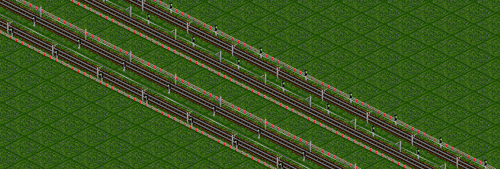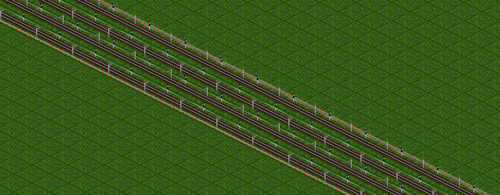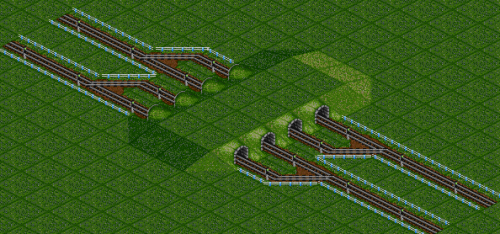Difference between revisions of "Mainline"
From #openttdcoop wiki
(fixed missing link to image) |
m (+categories) |
||
| (One intermediate revision by the same user not shown) | |||
| Line 1: | Line 1: | ||
| − | |||
| − | |||
Mainlines (ML) are the most important tracks in our cooperative games, they form the 'core' of the network, and allow timely movement of cargo. Mainlines can range in size from two tracks up to five or more, they usually run in both directions, but depending on the plan these may run in one. | Mainlines (ML) are the most important tracks in our cooperative games, they form the 'core' of the network, and allow timely movement of cargo. Mainlines can range in size from two tracks up to five or more, they usually run in both directions, but depending on the plan these may run in one. | ||
[[Image:Mainline.png|thumb|none|500px|A LL_RR bi-directional ML]][[Image:BigML.png|thumb|500px|none|A LLLL single direction ML]] | [[Image:Mainline.png|thumb|none|500px|A LL_RR bi-directional ML]][[Image:BigML.png|thumb|500px|none|A LLLL single direction ML]] | ||
<!-- feel free to change the filenames, and/or track sizes --> | <!-- feel free to change the filenames, and/or track sizes --> | ||
| − | Flow on a mainline is paramount, nothing should interrupt clean flow of traffic. As per the [[Basic Networking#Line Hierarchy|Line Hierarchy]] MLs have the highest priority of any track, and anything joining (say a [[Sideline]]), must yield track space, to ML traffic. ([[SML]]'s work slightly differently, by ML trains making space if possible, but this principle still holds true on those). | + | Flow on a mainline is paramount, nothing should interrupt clean flow of traffic. As per the [[Basic Networking#Line Hierarchy|Line Hierarchy]] MLs have the highest priority of any track, and anything joining (say a [[Sideline]]), must yield track space, to ML traffic. ([[SML|Shifted mainlines]]'s work slightly differently, by ML trains making space if possible, but this principle still holds true on those). |
| − | Since | + | Since we try to pack as many trains as possible onto the MLs, [[Signalling]] distance is every other tile, any interruptions to signalling must be compensated for. For this reason, it common to see sections of ML split into two or more tracks briefly and later merge. This type of construct is called doubling and it is important to maintain [[Line sync]] in it. A basic example is shown here: |
[[Image:Tunnel_Flow.png|thumb|none|500px|A simple line sync]] | [[Image:Tunnel_Flow.png|thumb|none|500px|A simple line sync]] | ||
| − | The '''LL_RR''' terminology denotes the default layout for all MLs on a map. | + | The '''LL_RR''' terminology denotes the default layout for all MLs on a map. "LL" are two left direction tracks, "RR" are two right direction tracks. The "_" indicates space between the directions. Taken literally, it is only one tile, but usually more tiles are used to ease expansions and hub construction.<br /> |
| − | + | In the same way, LLLL_RRRR is a mainline with 4 tracks per direction, sometimes called 4L_4R as this is easier to read. | |
| − | + | ||
== See Also == | == See Also == | ||
[[Ruleset]]<br /> | [[Ruleset]]<br /> | ||
[[Tutorial Savegame Mainline]] | [[Tutorial Savegame Mainline]] | ||
| + | |||
| + | [[Category:Guides]] | ||
| + | [[Category:Basic networking]] | ||
Latest revision as of 13:56, 6 August 2012
Mainlines (ML) are the most important tracks in our cooperative games, they form the 'core' of the network, and allow timely movement of cargo. Mainlines can range in size from two tracks up to five or more, they usually run in both directions, but depending on the plan these may run in one.
Flow on a mainline is paramount, nothing should interrupt clean flow of traffic. As per the Line Hierarchy MLs have the highest priority of any track, and anything joining (say a Sideline), must yield track space, to ML traffic. (Shifted mainlines's work slightly differently, by ML trains making space if possible, but this principle still holds true on those).
Since we try to pack as many trains as possible onto the MLs, Signalling distance is every other tile, any interruptions to signalling must be compensated for. For this reason, it common to see sections of ML split into two or more tracks briefly and later merge. This type of construct is called doubling and it is important to maintain Line sync in it. A basic example is shown here:
The LL_RR terminology denotes the default layout for all MLs on a map. "LL" are two left direction tracks, "RR" are two right direction tracks. The "_" indicates space between the directions. Taken literally, it is only one tile, but usually more tiles are used to ease expansions and hub construction.
In the same way, LLLL_RRRR is a mainline with 4 tracks per direction, sometimes called 4L_4R as this is easier to read.


